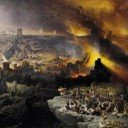As we continue our study of the warning signs found in the Olivet Discourse, we now turn our attention to a popular phrase from the discourse, wars and rumors of war. Again remember, just like the previous warning of False Christs, this is just the beginning of the birth pangs, or the early warning signs. Jesus is giving the disciples some things to be looking for so that they would know when to be ready to leave the city or area.
Matt 24:6 And you will hear of wars and rumors of wars. See that you are not alarmed, for this must take place, but the end is not yet. 7For nation will rise against nation, and kingdom against kingdom
When saw last time that there were plenty of “false Christs” running around at the time and that it should have been expected since the Daniel 70 Week prophecy was expecting fulfillment at that time and never before or after have there been such an onslaught of “false Christs.”. But with this warning, it appears so vague that any time in history would qualify as a time of “wars and rumors of war.”
Is there something unique about this time in human history that would make a warning about wars and tumults actually a warning sign? Many prognosticators over the last 50 years have been known to read the morning paper and note the various wars and skirmishes and relate those to their audience as “proof” of a soon coming tribulation. But hasn’t it always been that way?
THE PAX ROMANA
Historians tells us of a unique time in human history starting around 27 B.C. known as the “Pax Romana.” The Pax Romana, or Roman Peace, was a time of nearly hundred years in which the world was in relative peace. It was a “forced” peace to be sure in that was created by the iron fist of the Roman governmental control, but it was peace. There were no wars to speak of and any and all border skirmishes or revolts were non-existent or short-lived at best.
The Pax Romana was established by Caesar Augustus and was also a time noted for a lack of military expansion by the Roman army machine. This lack of expansion and limited civil uprising based on a stable, if not oppressive, government centered in Rome and led by the Caesars, created a physical presence of peace in the known world.
It is within this back drop that Jesus utters this warning sign of wars and rumors or war. A war or even a rumor of war would stand out. But here Jesus expands this warning to be wars and romurs of war - a plural. There will be multiple wars and rumors of war. And since this prophecy is also centralized to the Judean area one would need to argue Jesus would have that area in mind as well.
But what does history teach us about this? Note the list below and the dates at which these events took place in relation to the time of the siege and destruction of Jerusalem.
- Revolts in Brittanica (60 AD)
- Revolts and skirmished in Spain (60’s AD)
- Civil War in Gaul (early 60’s)
- Revolt in Thrace (50’s AD)
- Revolt in Africa (late 50’s)
- Revolt in Parthia (early 60’s)
- Jewish Revolt (63 AD)
- Civil unrest in Rome (68-73 AD)
- Civil War for power of throne in Rome after the death of Nero - including four emperors in a couple years (starting 69 AD)
There were wars and rumors of war the likes of which had not been seen for nearly one hundred years in the decade leading up to the destruction of Jerusalem. Even the Jewish revolt led by the zealots has the unique time frame of starting seven years before the fall of the city.
Does Jesus warning fit into the scheme of a 70AD fulfillment? It most certainly does. Not only that, it was given at a time of relative peace when the thought of war or even rumors of war could be used as a sign. No other time in human history would this be possible. Especially today since there is no relative peace in the world and a prediction of war is no prediction or warning at all!





No comments:
Post a Comment